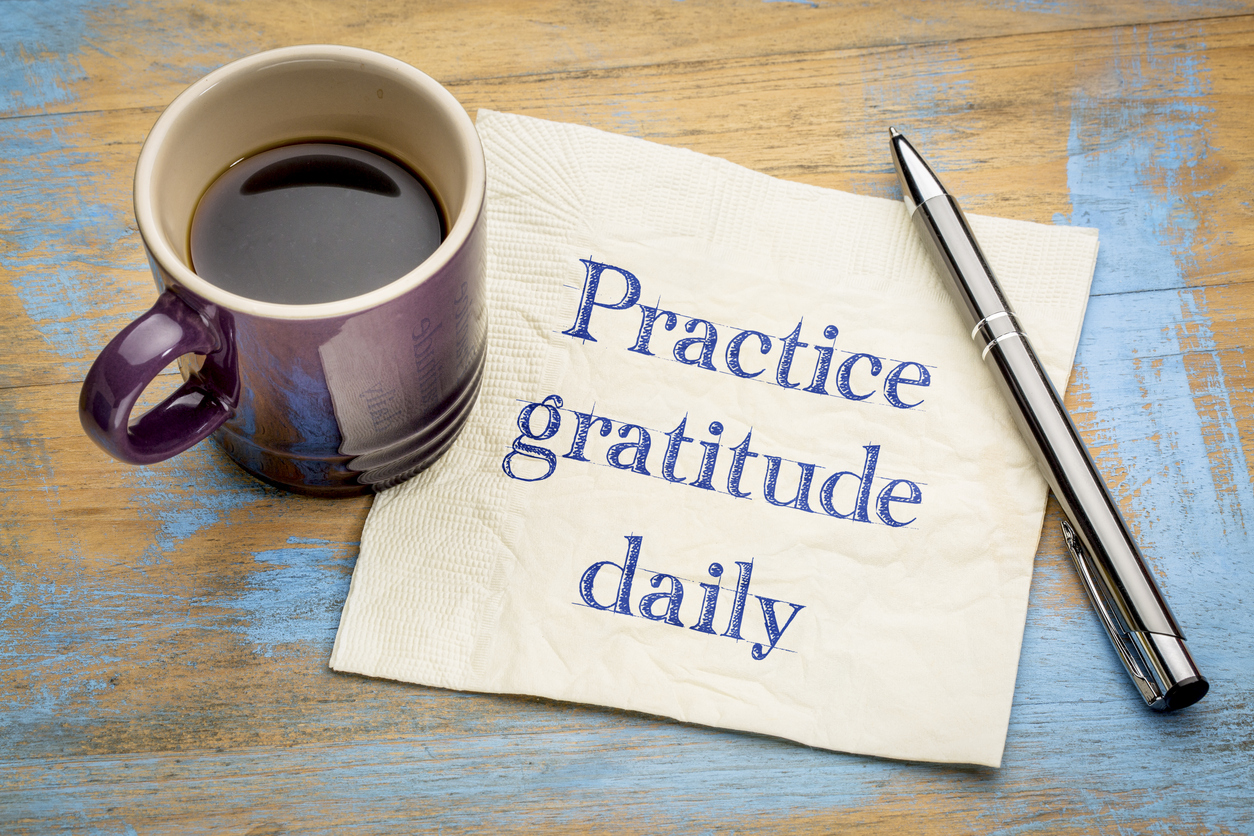Your wellness routine might include exercise, sleep and good nutrition. But are you also getting a regular dose of gratitude, which has been proven to make you happier and healthier? One of the world’s leading experts on the science of gratitude, Psychology Professor Dr. Robert Emmons of the University of California, Davis, found that gratitude is related to 23 percent lower levels of stress hormones (cortisol), a 10 percent improvement in sleep quality in patients with chronic pain and led to a 7-percent reduction in biomarkers of inflammation in patients with congestive heart failure. His research also found that activities like keeping a gratitude journal or writing letters of thanks helped people reduce dietary fat intake by as much as 25 percent and reduced the risk of depression in at-risk patients by 41 percent over a six-month period.
Ready to start pumping up your gratitude? Here are three ways to become more grateful:
1. Start a gratitude journal. Happiness Guru Shawn Achor, author of the Happiness Advantage and other best-selling books on the topic, notes that you can become happier by spending just two minutes a day, over the course of three weeks, journaling a few items you are grateful for. As this Inc. Magazine article reports, Achor notes that practice is powerful because you are training your mind to scan for positives, instead of threats, and it is the fastest way of teaching optimism. If you want to go beyond this baseline practice, check out this exercise I developed as an executive coaching tool to help people turn gratitude into rocket fuel. For example, it involves making a list of everything you are grateful for at that moment and the longer the list, the better. Savor each item as you write it, locking in the positive resonance it creates. Starting your day with this burst of positive energy does wonders for your attitude.
2. Express thanks. As reported in this Harvard Health Publishing article, thanking others is good for your own well-being. They wrote, “Dr. Martin E. P. Seligman, a psychologist at the University of Pennsylvania, tested the impact of various positive psychology interventions on 411 people, each compared with a control assignment of writing about early memories. When their week’s assignment was to write and personally deliver a letter of gratitude to someone who had never been properly thanked for his or her kindness, participants immediately exhibited a huge increase in happiness scores. This impact was greater than that from any other intervention, with benefits lasting for a month.” Giving thanks doesn’t have an expiration date. Back in high school, I had an AP English teacher who was very hard, determined to push us to do our best possible work. As a teenager I griped about the homework but as the years passed saw how she was truly one of the best educators of my academic career. Ten years later I wrote a letter of thanks, letting her know how much that rigorous style elevated my overall achievement. So, the next time you experience great service, take a moment to fill out an online survey or comment card. Send friends notes about how much they mean to you. Ensure you thank the people you work with for their contributions and support.
3. Take a “best possible outcome” mentality. In this ever-changing world, control can be an illusion – but you always have the power to pick your attitude. Let’s say your car gets a flat tire in a parking lot. Sure, it’s an inconvenience, and you’ll either need to change the tire yourself or call for help. But instead of turning this into an earth-shattering situation, look at it through the lens of being the best possible outcome. What if the tire blew out when you were driving on a crowded highway instead? Isn’t a flat tire better than a major car malfunction or accident where injuries could have occurred? Choosing to focus on the positive in every challenging situation helps build your gratitude muscles.
Self-development expert Brian Tracy once said, “Develop an attitude of gratitude, and give thanks for everything that happens to you, knowing that every step forward is a step toward achieving something bigger and better than your current situation.” His words ring so true. With a few simple gratitude-focused actions each day, you can claim a happier, more meaningful life.


